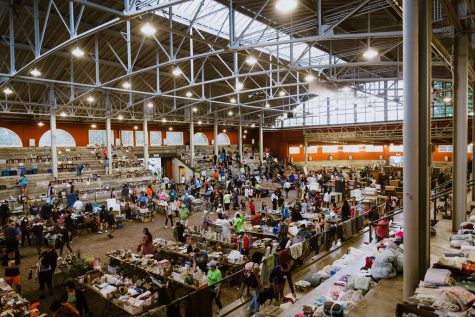Recycling habits grow in response to increased campus waste
Photo courtesy of Lyndsey Groth
People participate in the University YMCA’s annual Dump & Run event at the Stock Pavilion from Aug. 20-21. The event began 20 years ago in aiding efforts towards excess waste around campus.
Aug 30, 2022
Moving is one of the more stressful experiences one can go through. The stress can affect all groups but is especially pronounced for the waste management industry. The process also poses a problem unique to college towns and schools.
Earlier this summer, TikTok videos went viral highlighting how much waste schools and college dorms pile up at the end of the school year, with students throwing out many usable school and household supplies. Likewise, dumpsters around Campustown can be seen overflowing not only with trash, but also furniture and other miscellaneous items in good condition.
While waste from private housing is managed by local companies, residence halls and campus buildings are managed by Facilities and Services. Trends over the years show that during the month of August, trash from the residence halls go up to about 470 tons, about 100 tons more than in July. There were about 1,000 tons more of waste from move in this fall than there was in 2021.
Shreya Mahajan, junior in Engineering and an F & S sustainability intern, noted that based on her personal experience and the data available, certain months have significant hikes.
“Moving in and out does have a greater amount of waste that’s generated, it would be a bigger jump than other months,” Mahajan said.
Get The Daily Illini in your inbox!
There are several efforts to mitigate the issue of excessive waste around campus. Throughout August, the University YMCA has hosted its annual Dump & Run event, a tradition that started twenty years ago, where students and community members could dump their things and run.
Marc Alexander is the director of Development and Membership at the University YMCA, as well as the person behind this year’s program’s success. While the proceeds help fund programs at the YMCA, that is not the main focus of Dump & Run.

“The main reason is sustainability, it saves an estimated 30 tons of waste at landfills each year,” Alexander said. “It gives an opportunity to buy some really cheap stuff because we all know students don’t always have a lot of money. International students in particular will sometimes come to campus and only have a suitcase of items. So it really is a great opportunity for them to be able to save some money and save some stuff from the waste stream.”
Nichilah Akerele, junior in LAS and self-proclaimed thrift enthusiast, was one of the many students who got to score some unique finds.
“I was really happy to be there,” Akerele said. “I had no clue it existed. There’s so much waste on campus. When I moved out of Sherman last semester, everyone just put it in the trash room. School supplies, bedding and other perfectly good stuff. I wish we had something like this into the year. I hate seeing things go to waste.”
Alexander noted that the YMCA used to partner with residence halls, but stopped during the COVID-19 pandemic. However, the University will be running a similar program to prevent waste, alongside other programs to improve sustainability on campus. Alexander noted that the interest in the Dump & Run and sustainability on campus has certainly increased.
“I think, in general, the current generation of students is more concerned about this type of issue,” Alexander said. “We have a number of students that came through this year that had never heard about it and they all said, ‘I wish I knew about this.’ And it really is both the environment impact and the socio-economic aspect of it.”
The data analyzed by Mahajan also showed a trend that while landfill waste is still below pre-pandemic levels, the amount that is being recycled shows a 50% increase from 2019, which could indicate growing awareness and knowledge of recycling.
Mahajan encouraged students to visit the F & S website for resources regarding recycling to prevent massive landfill waste during August and September, as well as pickup service for bigger appliances so they can be properly recycled.






